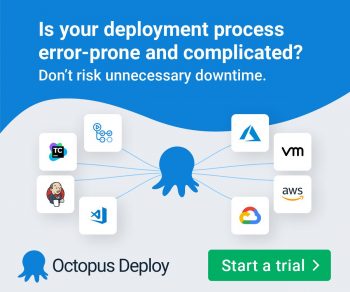Digitization across industries hit a massive acceleration in response to the pandemic. This dramatic shift in the way people interact, work and consume means businesses need to respond quickly and deploy fast. However, in this rush to move to digital platforms, forgetting about security may offset the advantages that even the most effective DevOps implementation can bring. In the race to implement fast solutions in increasingly complex environments, does the criticality of security falter? Not if organizations employ DevSecOps.
How DevSecOps integrates development, security, and operations
The public and private sectors have now fully embraced DevOps practices, yet frequently without adequate consideration of security. DevSecOps describes integrating security and compliance controls at every stage of the DevOps framework. The approach is to be secure by design, and that security is a critical consideration from start to end, not an afterthought.
Even in rapid deployment mode, security cannot be forgotten. Otherwise, your organization will face a new set of challenges related to your digital products, which could impact reputation and performance. To avoid this, the concept of DevSecOps ushers in a mindset change that holds accountable all stakeholders for security matters. Furthermore, it requires that security implementations have the same scalability and velocity of development and operations components.
Evolving your security practices without impacting agility with DevSecOps
Embedding security into the DevOps pipeline doesn’t block agility; it can actually help you bring the product to market faster. There’s a lot of confusion among executive leaders and even the tech community as to what DevSecOps really is. Many may think DevSecOps is replacing DevOps, but that is not true – in fact, it is DevOps done right. DevOps builds a framework for security that it didn’t have before. Security becomes code, increasing its speed and accuracy. Thus, DevOps doesn’t make security a more difficult proposition.
It’s important to understand that security at every phase of the development lifecycle doesn’t negatively impact velocity. The tools that enable rapid deployment are also usable for security. By applying the core principles of DevOps to security, DevSecOps further accelerates the delivery of higher quality and reliable software.
It would also be unfair to say that the development and operations teams don’t care about security. Of course, they do. They care about the reliability of their application and how it meets customer needs, and that involves their digital assets being secure. DevSecOps emphasizes the urgency to include security as a foundation within an organization’s DevOps practice. At its core, the movement brings together security, development, and operations teams to bake security into the SDLC from end to end.
With DevSecOps, security engineers work alongside developers, providing continuous feedback and visibility into known vulnerabilities rather than acting as a final check. Similar to the DevOps cultural change, the purpose of DevSecOps is to make security a shared responsibility in order to accelerate the delivery of better and more secure features at a lower cost.
The benefits of DevSecOps
Forward-thinking enterprises that lean into a DevSecOps mindset can fully benefit from the agility of DevOps while ensuring their digital products are highly reliable and secure. The benefits related to this goal include:
- Achieving continuous security by reducing vulnerabilities and malicious software without impacting deployment velocity
- Greater efficiency by strengthening security test tools and processes, focusing on prevention and mitigating the risk of vulnerability exploitation
- Better product quality, speed, agility, and higher innovation with development, operations, and security teams working together toward the same goal
- Meeting compliance requirements (essential in the Fintech industry, for example)
Risks of not leveraging DevSecOps
While DevSecOps has yet to reach global adoption, the movement is becoming mission-critical in many organizations. The rapidly evolving digital world, data proliferation, rising adoption of distributed systems and cloud computing all point to the fact that relying on traditional models for security is no longer viable. If security is not part of the process from the start, you could face serious risks.
The first risk is a delay of deployment, which directly impacts your users and your reputation. That can happen if security is the last stop, causing major reworking of code. This is both expensive and time-consuming. However, introducing security processes earlier in the cycle ensures that teams can identify and resolve security incidents as they occur.
Moreover, releasing products or new features that don’t meet security guidelines or best practices could lead to cyberattacks, compliance breaches, data losses, or other incidents. Plus, as the recent Executive Order on cybersecurity establishes new policies to strengthen the government’s cybersecurity defenses, they will quickly become the norm in the private sector as well, putting the spotlight on DevSecOps.
Another drawback of using traditional security practices is group breakdown when dealing with incidents. Because there’s not shared accountability, expect finger-pointing, eroding trust, and communication. Conversely, in the collaborative DevSecOps framework, teams improve their incidence response rate and the ability to detect and patch vulnerabilities faster than ever.
The final risk is not meeting customer expectations, whether that be internal or external. Failure to do this could lead to the abandonment of your application.
Achieving security, reliability, and compliance at the speed of DevOps
As the digital transformation reshapes all industries and sectors, rising concerns surrounding data security and increasing regulatory pressure emphasize the crucial value of DevSecOps. When applications are secure by design, the speed and frequency of releases in a DevOps environment reach a new high without compromising security and compliance. Still, achieving speed and safety requires that security initiatives align with business objectives. In today’s digitally-enabled world, organizations become increasingly vulnerable to cyberattacks. In addition to improving the agility of DevOps to maintain competitiveness, DevSecOps helps companies in the private and public sectors strengthen their cyber defenses.

















